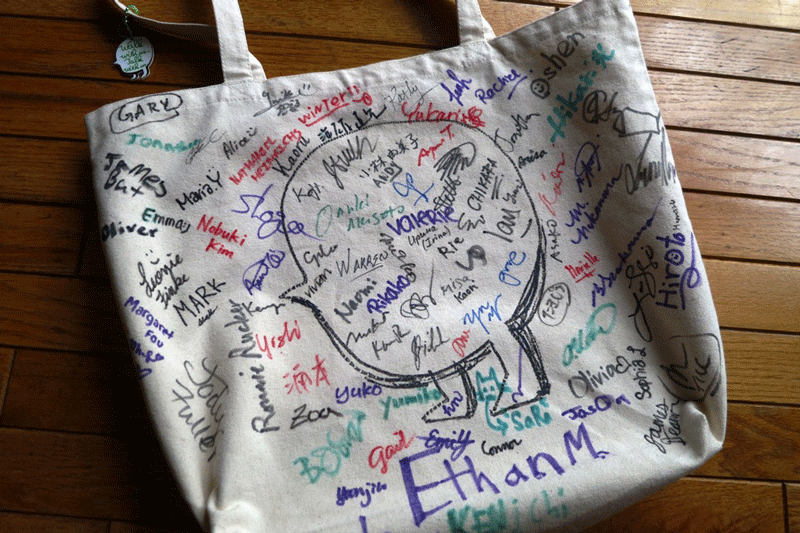With every milestone comes the opportunity for a new beginning, a chance to reflect on who we are and what we’ve learned, assimilating it into a new identity. So on its 40th birthday, a couple years ago, Tokyo English Life Line changed its name: “TELL,” a reflection of the many ways in which the organization has grown and changed.
By Sarah Custen
“We are more than just a lifeline,” says Lifeline Director, Vickie Skorji, “and although the name says Tokyo…we’ve always been supporting people across the country.” TELL’s 40th anniversary also marked an official expansion of their program beyond Tokyo, with the opening of a Kobe Lifeline and related Kansai area volunteer training program.
Their influences have changed, as well, since the 70s. Originally founded by missionaries, TELL continues to receive invaluable help from various churches, but their mission and message are now completely non-denominational. “We’ll talk to anyone about anything,” Skorji said.
Growth and Expansion
As Japan’s only English language lifeline, TELL’s support ranges from run-of-the-mill information and service questions (“How do I file my taxes?”) to crisis intervention – HIV, rape, pregnancy support, and of course suicide prevention. TELL has also expanded to offer face-to-face counseling, for those who need longer-term help and support, on a sliding scale fee, to ensure that nobody slips through the cracks.
“So many of our callers were saying they wanted something more,” Skorji explained. “The lifeline is the first port of call – it’s about crisis intervention as well as reducing stress – but it’s certainly not about long-term counseling. We’re not looking into backgrounds, it’s confidential, it’s anonymous. It has different goals and a different function.”
“It doesn’t matter how big or small that problem is,” Skorji continued. “The Lifeline will talk to you about anything, from ‘I’m lost, can you help me?’ to ‘I don’t think I can make it through the night.’”
Face-to-face counseling offers not only a deeper level of connection, but also professionalism. “Everyone at TELL [Counseling] is fully licensed and accredited with a governing body, most of them have been trained overseas, and every four years the clinic undergoes an accreditation process by the Samaritan Institute,” said Skorji, adding, “Our therapists don’t just get their license and that’s where they stay put – they have to maintain ongoing supervision, ongoing points to keep their licenses registered and up-to-date.” Even the volunteer-based Lifeline is held to a high international standard, ensured by working in conjunction with the umbrella organization Lifeline International.
Setting a Higher Standard
This is a far cry from the norm for psychiatric care in Japan, which is not uniformly regulated, and rarely counseling-based. “Most people in Japan would go to a psychiatrist; they’d be lucky if they saw the psychiatrist for 5 minutes…and so that means that most people are medicated,” said Skorji. “While medication is important, it’s not teaching you skills or helping you to deal with what’s going on.”
But it’s cheaper medication and doctor’s office visits in Japan that are covered, at least partially, by insurance, whereas counseling and talk therapy are not. To combat this, TELL Counseling operates on a sliding scale: people pay what they are able, and those who are able to pay more do so knowing that they’re ensuring proper treatment and support for others. “There’s this perception in the community that the clinic is perhaps expensive, but it’s trying to do two things,” explained Skorji, “It’s trying to help, if it can, with supporting the Lifeline [financially], but it’s also trying to help those who can’t afford it otherwise.”
However, with no government funding, the difference is often hard to make up, and TELL constantly struggles to continue to provide much-needed services while paying bills, paying salaries, and keeping an office running.
“Who out there in the community [besides TELL] is providing reduced fee services for those who can’t pay?” asks Skorji. “But how do we compensate for that? And who is helping us?”
Help Us Help You
The sense of urgency and frustration is palpable when Skorji speaks – a passion for helping those in need tied directly to a constant worry at not being able to find the means. And it makes sense, when you consider what’s at stake: over a million people die each year from a mental health-related problem. “Every day 70 something people are going to be gone in Japan,” said Skorji, almost at a loss for words. She cites studies that show one in four people will suffer a mental health problem, that most issues first appear in adolescence, that parent education and school outreach are crucial. “We know this is happening,” she said, “So what are we doing?”
Quite a lot, as it turns out. In addition to the Lifeline and Counseling, TELL Outreach provides suicide prevention workshops, child protection workshops, school awareness and “psychological first-aid training,” to better equip people for when disaster strikes (as with the 2011 earthquake).
But it’s still not enough. Skorji describes the desperate need for a 24-hour Lifeline, “because we know that people are most at risk between the early hours of the morning, and we’re not there.” They also know, following the latest research, that young people are more likely to text than talk, and so the need for a chat line, where people can message back and forth with trained volunteers, is high up on their list.
“Everybody is screaming for these services,” says Skorji, “but how do we supply them?”
Getting Involved
In order to achieve their immediate goals TELL needs two things: people and money. “There are a thousand ways people can help,” Skorji explains.
The top priority is volunteers for the Lifeline: with only 20 or so more people per year, they can go round-the-clock. The next training session in Tokyo begins early October (Kansai begins September 26). It’s a 10-week program, offered both in person or online, with a commitment of only 10 hours (2 shifts) per month.
Most volunteers find the benefits of training extend into their work and personal life. “The skills that you learn in training are really good skills to have, no matter what your qualifications or background,” Skorji said. She describes how volunteers learn to to put aside their own issues, needs and judgements for a few hours, and, in doing so, “learn how to really listen. It’s one of the most under-taught and under-valued skills: listening. “The skills that you learn…they just make you a better person,” says Skorji.
For those unavailable for such a commitment, TELL is always accepting donations. They hold a yearly “Connoisseur’s Auction,” which will celebrate its 20th anniversary this November. Considered one of Tokyo’s top wine events, TELL supporters are invited to donate their time in support of the auction, or simply attend and enjoy.
Breaking the Silence, Breaking the Stigma
Perhaps more than time or money, TELL needs voices: people willing to speak up and raise awareness for mental health. “We just need people to come along and support and make noise,” said Skorji. One such opportunity takes place this Thursday the 10th – World Suicide Prevention Day. Volunteers and supporters will join TELL in their 2nd Suicide Awareness “Talkie Walkie,” planning their own walks or join an existing walk. “It’s about getting together and not being ashamed about mental health.”
Raising awareness also means clueing people in to suicide’s warning signs and encouraging them to reach out. “We know that 95% of people who die by suicide suffer some form of mental health problem, and most of them are not getting the support they need,” said Skorji.
Community support and understanding is crucial. Though the stigma surrounding mental illness is a worldwide problem, Skorji believes it’s more severe here than it is in the West. “Within Asia, there’s a great sense about shame and losing face,” she explained. “So people are ashamed, and they feel that – even when they’re diagnosed with a mental health problem – it’s a weakness in them.” She says traditional community response to mental health issues tends to compound the problem.
Imagine you have cancer, she says, or go to the hospital for surgery – people will be there, supporting you. If you attempt suicide, however, “It’s going to be hushed up, there’s going to be shame, and you’re going to be feeling like you did something so bad,” Skorji said. “So if you’re going to try that again, you’re going to make sure that you’re successful. We’ve got it so, so wrong.”
Especially when it comes to teens. At most schools, there’s help for parents to talk to their kids about drugs, about sex, about grades…but not about mental health, which often underlies problems with drugs or at school.
“With a mental health problem,” Skorji explains, “you’re not going to be able to think your way out of it because…thinking is a mental activity.” She compares it to other physical disorders: you wouldn’t expect someone to will their way out of diabetes or cancer. “Yet, with all the information out there on the Internet, with all the technology that we have, what is it about humans around the world that want to give some special power to our brains?”
How to Help
So what should you do if someone you know is struggling? “If you need help, calling the Lifeline is the first step,” said Skorji. “We can figure out what you need, where do you live, what’s around you, and figure out what is the best support available to you.
“It doesn’t matter how big or small that problem is,” Skorji continued. “The Lifeline will talk to you about anything, from ‘I’m lost, can you help me?’ to ‘I don’t think I can make it through the night.’”
Perhaps the biggest way to help is simply to speak out about your own experiences with mental health, and with TELL. “You know what I really need?” asked Skorji. “I need people who are willing to say “I called that line, and here’s my testimonial.”
Allow me to get the ball rolling: I called that Lifeline, and it saved my life.
To find out more about TELL, and how you can get involved, visit telljp.com










